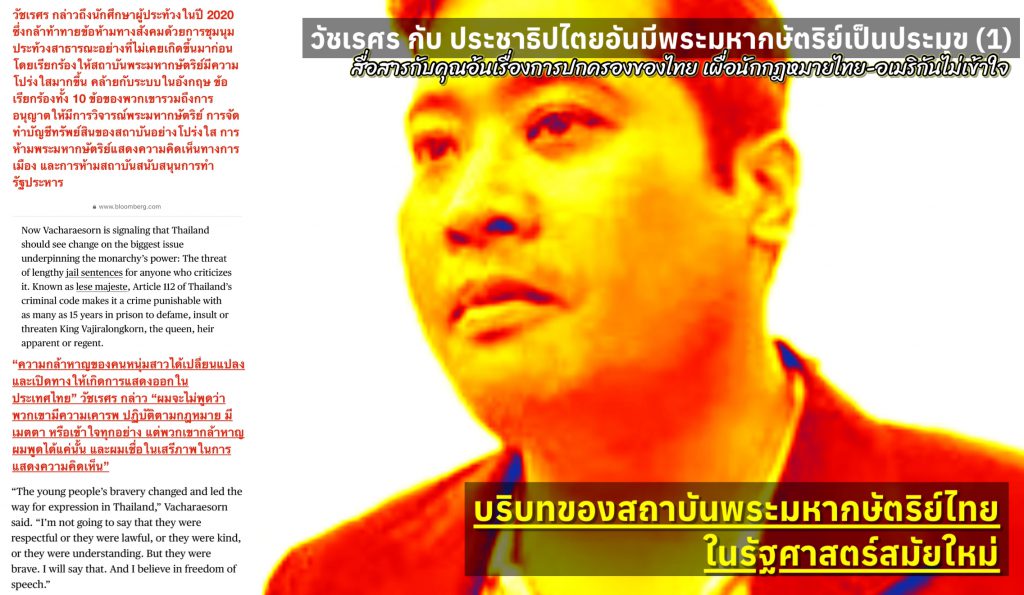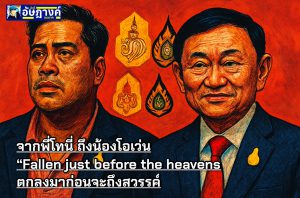
วัชเรศร กับ ประชาธิปไตยอันมีพระมหากษัตริย์เป็นประมุข (1)
โดย อัษฎางค์ ยมนาค
สถาบันพระมหากษัตริย์กับประชาธิปไตยแบบรัฐธรรมนูญของไทย ในมุมมองทางรัฐศาสตร์
บทนำ
สถาบันพระมหากษัตริย์มีบทบาทสำคัญในการกำหนดอัตลักษณ์ของชาติ การปกครอง และเสถียรภาพของประเทศไทย แม้ประเทศไทยจะปกครองในระบอบประชาธิปไตย แต่พระมหากษัตริย์ยังทรงดำรงตำแหน่งเป็นประมุขของรัฐ ซึ่งเป็นลักษณะเฉพาะของ ประชาธิปไตยอันมีพระมหากษัตริย์เป็นประมุข (Constitutional Monarchy)
ในช่วงไม่กี่ปีที่ผ่านมา ได้เกิดขบวนการทางการเมืองที่เรียกร้องให้ ปฏิรูปหรือล้มล้างสถาบันพระมหากษัตริย์ รวมถึงการยกเลิก มาตรา 112 ของกฎหมายอาญา ซึ่งนำไปสู่ข้อถกเถียงอย่างกว้างขวาง ขบวนการเหล่านี้มีทั้งพรรคการเมือง เช่น พรรคอนาคตใหม่ พรรคก้าวไกล พรรคประชาชน รวมถึงกลุ่มประชาชนและองค์กรภาคประชาสังคมที่เคลื่อนไหวในประเด็นนี้ และล่าสุดบทสัมภาษณ์ของคุณอ้น วัชเรศร วิวัชรวงศ์ ได้สร้างข้อถกเถียงเกี่ยวกับท่าทีของเขาต่อแนวทางเหล่านี้
บทความนี้จะวิเคราะห์บทบาทของสถาบันพระมหากษัตริย์ไทยผ่าน แนวคิดสถาบันนิยม (Institutionalism) แนวคิดเกี่ยวกับ เสถียรภาพทางการเมือง (Political Stability) และบทบาทของ สถาบันกษัตริย์ในโลกสมัยใหม่ เพื่อทำความเข้าใจว่าทำไมสถาบันพระมหากษัตริย์ยังคงเป็นเสาหลักของความมั่นคงของประเทศไทย
แนวคิดสถาบันนิยม (Institutionalism) และบทบาทของสถาบันพระมหากษัตริย์ไทย
แนวคิดสถาบันนิยมคืออะไร?
แนวคิดสถาบันนิยม (Institutionalism) เป็นแนวคิดทางรัฐศาสตร์ที่เน้น ความสำคัญของสถาบัน ในการกำหนดพฤติกรรมทางการเมืองและโครงสร้างการปกครองของรัฐ นักวิชาการ เช่น Samuel Huntington และ Douglass North ชี้ให้เห็นว่าสถาบันที่แข็งแกร่งสามารถ สร้างเสถียรภาพทางการเมืองและเศรษฐกิจ ได้
ในบริบทของประเทศไทย สถาบันพระมหากษัตริย์ถือเป็นหนึ่งในสถาบันหลักของรัฐ ที่มีบทบาทสำคัญในการรักษาความต่อเนื่องของการปกครองและความมั่นคงของชาติ
บทบาทของสถาบันพระมหากษัตริย์ไทยในเชิงสถาบันนิยม
สถาบันพระมหากษัตริย์มีบทบาทที่สำคัญหลายประการ ได้แก่
• บทบาทเชิงสัญลักษณ์ – เป็นศูนย์รวมจิตใจของประชาชนและเป็นรากฐานของความเป็นปึกแผ่นของชาติ
• บทบาทด้านเสถียรภาพทางการเมือง – มีส่วนช่วยไกล่เกลี่ยความขัดแย้งทางการเมืองและลดความรุนแรงในสถานการณ์วิกฤติ
• บทบาทด้านการพัฒนา – สนับสนุนโครงการพัฒนาประเทศในด้านต่างๆเช่นเกษตรกรรมสาธารณสุขและการศึกษา
ตามแนวคิดสถาบันนิยม สถาบันพระมหากษัตริย์ไม่ใช่เพียงสัญลักษณ์ของชาติ แต่เป็น กลไกที่ช่วยสร้างเสถียรภาพทางการเมือง และเป็นเสาหลักของโครงสร้างทางสังคมและการปกครองของไทย
เสถียรภาพทางการเมืองและความท้าทายจากขบวนการต่อต้านสถาบัน
เสถียรภาพทางการเมืองคืออะไร?
เสถียรภาพทางการเมือง (Political Stability) หมายถึง สถานะของรัฐที่สามารถดำรงอยู่ได้โดยปราศจาก ความขัดแย้งรุนแรงหรือการเปลี่ยนแปลงเชิงโครงสร้าง ที่อาจนำไปสู่ความแตกแยกของประเทศ
สถาบันที่แข็งแกร่ง เช่น สถาบันพระมหากษัตริย์ มีบทบาทสำคัญในการ รักษาสมดุลระหว่างกลุ่มอำนาจทางการเมืองและป้องกันไม่ให้รัฐเผชิญกับวิกฤติที่อาจนำไปสู่ความไร้เสถียรภาพ
ขบวนการต่อต้านสถาบันพระมหากษัตริย์และผลกระทบต่อเสถียรภาพของชาติ
ขบวนการที่เรียกร้องให้ลดบทบาทหรือยกเลิกสถาบันพระมหากษัตริย์มีแนวโน้มที่จะส่งผลกระทบต่อเสถียรภาพของประเทศในหลายด้าน เช่น
• แนวคิดประชาธิปไตยสุดโต่ง (Radical Democracy) – พยายามลดอำนาจของสถาบันผ่านกระบวนการทางกฎหมายและการเมือง
• การใช้สื่อและโซเชียลมีเดีย – เพื่อบิดเบือนข้อเท็จจริงและสร้างความไม่ไว้วางใจต่อสถาบัน
• ความพยายามแก้ไขกฎหมายมาตรา 112 – ซึ่งเป็นกฎหมายที่มีขึ้นเพื่อปกป้องสถาบันจากการโจมตีที่อาจก่อให้เกิดความแตกแยกในสังคม
บทบาทของมาตรา 112 ในการรักษาความมั่นคงของชาติ
มาตรา 112 ของประมวลกฎหมายอาญามีไว้เพื่อ ป้องกันการล่วงละเมิดต่อสถาบันพระมหากษัตริย์ เช่นเดียวกับที่ประเทศอื่น ๆ มีกฎหมายคุ้มครองประมุขของรัฐ
ศาลรัฐธรรมนูญไทยได้วินิจฉัยว่า การเคลื่อนไหวเพื่อยกเลิกมาตรา 112 เป็นส่วนหนึ่งของกระบวนการที่อาจนำไปสู่การเปลี่ยนแปลงโครงสร้างการปกครองของประเทศ ดังนั้น การปกป้องมาตรา 112 จึงเป็นการป้องกัน ความไร้เสถียรภาพทางการเมืองที่อาจเกิดขึ้นจากขบวนการต่อต้านสถาบัน
บทบาทของสถาบันพระมหากษัตริย์ในโลกสมัยใหม่
สถาบันพระมหากษัตริย์ในประชาธิปไตยแบบรัฐธรรมนูญ
ในหลายประเทศ เช่น สหราชอาณาจักร ญี่ปุ่น และสเปน สถาบันพระมหากษัตริย์ยังคงมีบทบาทสำคัญ แม้ว่าพระมหากษัตริย์จะไม่มีอำนาจทางการเมืองโดยตรง แต่ยังคงเป็น ศูนย์รวมของเอกลักษณ์ประจำชาติและมีบทบาทในการรักษาเสถียรภาพของประเทศ
ความแตกต่างของสถาบันพระมหากษัตริย์ไทยกับประเทศอื่น ๆ
สถาบันพระมหากษัตริย์ไทยมีบทบาทที่ กว้างกว่าระบบ Constitutional Monarchy ทั่วไป โดยมีบทบาทในด้านต่าง ๆ เช่น
• การไกล่เกลี่ยความขัดแย้งทางการเมือง – เพื่อลดความรุนแรงและป้องกันความแตกแยกของชาติ
• โครงการพัฒนาเพื่อประชาชน – พระมหากษัตริย์ไทยมีบทบาทในการพัฒนาเศรษฐกิจและสังคมโดยตรง
• ความเป็นศูนย์รวมของอัตลักษณ์ไทย – ทำให้สถาบันพระมหากษัตริย์เป็นส่วนสำคัญของความมั่นคงของชาติ
บทสรุป: การปกป้องสถาบันพระมหากษัตริย์คือการรักษาเสถียรภาพของชาติ
จากการวิเคราะห์ในเชิงรัฐศาสตร์ สถาบันพระมหากษัตริย์ไม่ใช่เพียง สัญลักษณ์ทางประวัติศาสตร์ แต่เป็น เสาหลักของเสถียรภาพของประเทศไทย การลดบทบาทหรือล้มล้างสถาบันอาจส่งผลให้ เกิดความแตกแยกและความไร้เสถียรภาพ ในระยะยาว
ดังนั้น การปกป้องสถาบันพระมหากษัตริย์จึงเป็นมากกว่าการรักษาระบบดั้งเดิม แต่เป็นการปกป้องเสถียรภาพของประเทศไทยในฐานะชาติที่มีอัตลักษณ์และการปกครองของตนเอง
The Monarchy and Thailand’s Constitutional Democracy: A Political Science Perspective
Introduction
The institution of the monarchy has played a pivotal role in shaping Thailand’s identity, governance, and national stability. While Thailand is a constitutional democracy, the monarchy remains the head of state, a defining characteristic of a constitutional monarchy.
In recent years, political movements advocating for the reform or even abolition of the monarchy, as well as the repeal of Article 112 (the lèse majesté law), have sparked national debates. These movements, led by political parties such as the Future Forward Party, Move Forward Party, The People’s Party and various civil society groups, have challenged the traditional role of the monarchy within Thai governance.
And recently, the latest interview with Vacharaesorn Vivacharawongse has sparked debate regarding his stance on these issues.
This essay explores the role of the Thai monarchy through institutionalist theory, the concept of political stability, and the modern role of monarchies in democratic governance. By analyzing these perspectives, we can understand why the monarchy remains a crucial pillar of Thailand’s stability and political structure.
Institutionalism and the Role of the Thai Monarchy
What is Institutionalism?
Institutionalism is a political science theory that emphasizes the importance of institutions in shaping political behavior and governance. Institutions are seen as structured mechanisms that influence policy-making and ensure the continuity of the state. Scholars such as Samuel Huntington and Douglass North argue that strong institutions contribute to political and economic stability.
In Thailand, the monarchy has functioned as one of the country’s most enduring and influential institutions. Its role extends beyond a ceremonial figurehead; it has been an integral part of statecraft, social development, and national unity.
The Monarchy’s Role in Institutionalism
The Thai monarchy has played several crucial roles that align with institutionalist principles:
• Symbolic Role: The monarchy serves as a unifying symbol for the Thai people, fostering a sense of national identity and cultural continuity.
• Political Stability: Historically, Thai monarchs have intervened in moments of crisis to mediate conflicts and prevent political upheaval.
• Developmental Contributions: The monarchy has initiated various social and economic projects that address inequality, promote rural development, and improve public welfare.
According to institutionalist theory, an institution’s strength is measured by its ability to adapt and maintain legitimacy. The Thai monarchy’s historical role in nation-building, governance, and crisis management reinforces its importance in maintaining state stability.
Political Stability and Challenges from Anti-Monarchy Movements
Defining Political Stability
Political stability refers to a state’s ability to function without internal strife, violent upheaval, or systematic breakdowns. In many constitutional monarchies, the monarchy acts as a stabilizing force that helps prevent power struggles and safeguards national unity.
Thailand’s monarchy has historically served as a key factor in preventing national fragmentation by maintaining continuity amidst political transitions. However, in recent years, anti-monarchy movements have emerged, seeking to reduce or eliminate the institution’s influence.
Anti-Monarchy Movements and Their Impact
The rise of movements advocating for monarchy reform or abolition presents challenges to Thailand’s political stability. These movements employ various strategies, including:
• Radical Democratic Rhetoric: Advocating for a form of “radical democracy” that seeks to dismantle traditional power structures.
• Media Manipulation: Using social and digital media platforms to promote narratives against the monarchy, often distorting historical and political facts.
• Legal Attacks on Article 112: Pushing for the repeal of Thailand’s lèse majesté law, which protects the monarchy from defamation, a protection similar to laws safeguarding heads of state in other nations.
The Role of Article 112 in National Stability
Article 112 of Thailand’s Criminal Code is designed to prevent actions that undermine the monarchy’s integrity. Critics argue that it suppresses free speech, while supporters believe it is essential to maintain national stability.
Thailand’s Constitutional Court has ruled that efforts to abolish Article 112 are not merely about free speech but are part of an attempt to dismantle Thailand’s constitutional monarchy. This highlights the broader geopolitical and ideological conflict between traditional institutions and radical reform movements.
The Role of Monarchies in Modern Democratic Systems
Monarchy in a Constitutional Democracy
Many modern democracies, including the United Kingdom, Japan, and Spain, retain constitutional monarchies. While these monarchs have limited formal political power, they remain influential through symbolic, diplomatic, and national security roles.
Thailand’s monarchy differs from many Western constitutional monarchies because of its active engagement in national development and crisis management. Unlike purely ceremonial monarchies, the Thai monarchy has played a role in:
• Political Mediation: Thai monarchs have intervened in national crises to resolve conflicts and prevent political instability.
• Social Welfare Initiatives: Many royal projects focus on poverty reduction, education, and infrastructure development.
• Cultural and National Identity: The monarchy remains central to Thailand’s historical and cultural continuity.
Why the Thai Monarchy Remains Essential
Despite calls for reform, the monarchy continues to be a crucial institution for national unity and stability. If weakened or abolished, the Thai political landscape would face increased polarization, greater uncertainty, and potential instability.
Historically, countries that dismantle their monarchies without a stable alternative often experience turmoil. The abolition of monarchies in nations like Iran (1979) and Libya (2011) led to decades of political chaos and internal conflicts.
Conclusion: Protecting the Monarchy as a Means of Ensuring Stability
From an institutionalist perspective, the Thai monarchy is more than a symbolic relic; it is a functional pillar of national stability. The monarchy’s ability to mediate political conflicts, drive social development, and preserve cultural heritage makes it indispensable.
While calls for reform and democratic advancements should be acknowledged, efforts to dismantle the monarchy outright would likely lead to greater political instability and fragmentation. The protection of Thailand’s monarchy is not just about defending a historical institution, but about safeguarding the long-term stability of the nation.
Ultimately, Thailand’s constitutional democracy with a monarchy remains a balanced model that provides both democratic participation and institutional continuity, ensuring the nation’s stability amidst global political shifts.



